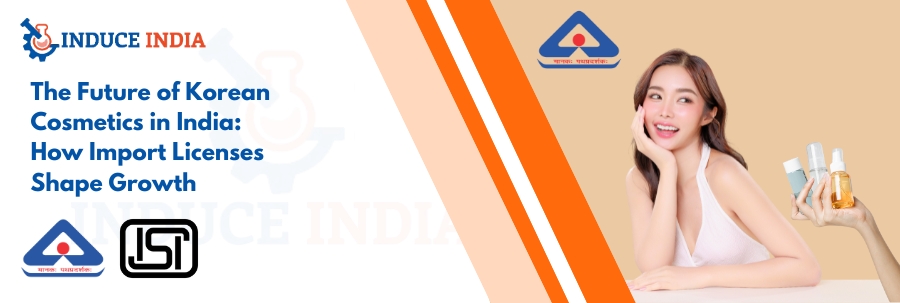Over the last couple of years, Korean skincare and cosmetics have stormed the beauty world across the globe. Whether it is glass skin care routines, snail mucin serums or sheet masks, K-beauty is not only a fad anymore; it is an emerging lifestyle. India is a fast-growing beauty market, and now the young people of India are much more aware of skin care cosmetic products, and this makes Korean cosmetic brands one of the most sought-after potential destinations.
However, as Korean beauty continues to garner a buzz, an even more insidious yet vital thing occurs that defines how such items reach the houses of Indians: the import license.
This blog looks at the future of Korean cosmetics in India and the importance of import licenses in either boosting or hindering the expansion of Korean cosmetics.
Korean Cosmetics: An Emerging New Trend in India
The beauty market of India is changing. People are transitioning to a less makeup-reliant way of life in the skincare culture. Here, Korean beauty products, which contain innovative formulas, pleasant ingredients, and skincare steps, have gained a great connection.
Every Indian consumer, primarily Gen Z and millennials, is always seeking:
- Those products which fit the sensitive Indian skin
- Vegan, vegan-friendly and cruelty-free products
- So-called Instagram-worthy packaging and influencer-endorsed routines
- Ingredients proven by science, such as niacinamide, peptides, ceramides, centella asiatica
Even Korean brands such as Innisfree, Laneige, Cosrx, The Face Shop, and Some By Mi already have their fans in India. However, with this growing demand, it is time to import and register more products.
What is known as an Import License? Why are they needed?
Under Indian laws, any Korean cosmetic has to be registered and licensed properly through a formal process of importation before the same can legally be marketed in India.
Among them, the Drugs and Cosmetics Act, 1940, and the Cosmetics Rules, 2020, are the keystone of regulation regarding cosmetics conducted in India.
Under this law, all products of cosmetics imported into the country have to be registered with the Central Drugs Standard Control Organisation (CDSCO), and there should be an import license. It is through it that the product will be marketed and sold.
Simply stated, the license of import is a legal green signal that certifies:
- The product is not harmful to use.
- It is Indian regulatory compliant
- It is genuine, not fake or low-quality product
- All documentation and testing have been passed successfully on it
Although this process is in some cases long and complicated, it is an imperative procedure that can safeguard the health and safety of Indian consumers and ensure that there is transparency in the beauty business.
The Effect of Import Licenses on the Korean Cosmetic Growth
-
Speed to market
Seemingly, one of the largest obstacles of Korean brands in India is the delayed launch of their products which occurs because of the waiting time on the import licenses. Indian beauty market is a competitive market. A hot trend may be a thing of yesterday.
When brand firms fail to deliver their new products to the country in time, they will lose great opportunities in market. Faster availability, promotion, and consumer access to the most recent inventions of Korean skin care are possible when processed via import licenses within a short time.
-
Trust and legitimacy
An import license guarantees that the product is registered and not a grey market product purchased over the internet and delivered informally.
- To the consumer, this implies:
- International requirement of English labelling. Proper ingredient listing and labelling
- There are no potent prohibited drugs
- Easy guidelines on usage. Clear usage instructions
- Sympathetic insurance of the safety of products used
The Korean companies which adopt the Indian import licensing mechanism earn consumer confidence and a reputation for safety, responsibility, and compliance.
-
Brand Distribution and Brand Partnership.
The Indian retailers, online stores (e-commerce), and multi-brand retail shops are fond of doing business with licensed importers or registered brand owners. These channels can even decline to stock the products when they lack proper documentation.
Thus, a legal import license becomes the door to growth- the possibility to establish a kind of union with the most selling products, such as:
- Nykaa
- Amazon India
- Lifestyle
- Sephora
- Separate beauty salons
This is needed for scaling and brand visibility in the Indian market.
Obstacles that Korean brands have encountered with import licenses in India
Irrespective of the advantages, the process of import licensing may be both tricky and laborious, particularly to foreign brands that have no know-how of the Indian regulatory systems.
Among the common difficulties, there are:
- Expensive paperwork with the product information, production methods, test reports and ingredient listing
- Communication barrier, as several Korean records require translation
- Multiple product registrations (the registrations of each variant require authorisation separately)
- Alterations in the Indian rules, which have to be frequently changed
- The absence of a local representation, by which foreign brands have to makes it harder to apply directly
At times, these obstacles can put off smaller Korean brands from entering the Indian market, taking away access to some of the most innovative beauty products available in the world, to the consumer.
The Work of Import Consultants and Licensing Experts
This is where there are import licensing professionals or regulatory service firms. Indian partners of Korean brands are assisted with the help of the agency, such as Induce India.
- Overcome the process of CDSCO registration
- Get and deliver all required documents
- Maintain good business relations with the Indian government
- Learn and know what goes on in terms of rules and changes in cosmetics
- Minimise the likelihood of rejections or delays
Such consultancies are driving the Korean beauty boom in India, in one way, secretly acting as the facilitator between Korean manufacturers and the Indian regulators.
Future: An Emerging Reality: A Rising Opportunity
The Korean cosmetic future towards India is very bright. Based on research on the market:
The Indian beauty and personal care industry is projected to rise to 2,00,000 crore by 2027.
The growth is being led by skincare, and in particular, synthetically-packed serums, toners, masks and sunscreens.
Not only the Tier 2 cities but also the Tier 1 cities are seeing an increase in demand for high-quality and international brands. Since an increasing number of Indian customers are seeking genuine K-beauty, companies willing to finance legitimate import licenses will have a first-mover privilege. They will be considered feasible, legal and dedicated towards the Indian market.
Besides, the recent initiative of CDSCO to introduce the digitalisation of the registration process and ease documentation is an indication of the future friendlier regulatory environment.
Conclusion
The cosmetics made in Korea are not just pretty packaging and cool-sounding names; they are a good skincare science of worldwide popularity. And India is prepared. However, as demand is so high, only the brands which have the correct legal procedures (such as acquiring the corresponding import licenses) will manage to grow and become successful.
The import license is not a challenge on its own, it is the launchpad to make the journey legal, with safety and in a sustainable manner. Licensing is not mere paper work, but it is the first step towards growth of Korean beauty in India.



